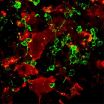(Press-News.org) DALLAS – May 10, 2011 – Children whose mothers are successfully treated for depression show progressive and marked improvement in their own behaviors even a year after their moms discontinue treatment, new UT Southwestern Medical Center-led research shows.
Additionally, the faster mothers got better, the faster their kids improved – and the greater the degree of improvement experienced.
"If you treat the mother when she is depressed and don't even go through the process of treating the children of these mothers, they still get better as their mothers get better," said Dr. Madhukar Trivedi, professor of psychiatry at UT Southwestern and a co-author of the study, recently published in the American Journal of Psychiatry. "It is very rare to treat a patient and have an impact on people around the patient that is this significant.
"While the effect in the short term is clearly robust, the bigger issue is that this effect is long-lasting," he said. "One year after their mothers' remissions, these children continued to show further improvement. This is almost unbelievable."
The study is the final in a series of analyses documenting the negative effects depressed moms have on their children. Moms and their children were followed as part of the nation's largest multisite clinical trial on treatments for depression, begun in fall 1999. UT Southwestern served as the national coordinating center for the $35 million, four-year study called STAR*D (Sequenced Treatment Alternatives to Relieve Depression) and funded by the National Institute of Mental Health (NIMH).
About 2.5 percent of children and up to 8.3 percent of adolescents in the U.S. suffer from depression, according to figures compiled by the NIMH. Research also indicates that depression onset occurs earlier in life today than in past decades. Depression in young people is often accompanied by physical illnesses and other mental disorders such as anxiety, disruptive behavior or substance abuse.
"Depression should not be taken lightly," Dr. Trivedi said. "For kids' sakes, we should be very aggressive in treating patients, particularly mothers. The more improved care we can provide to depressed mothers, the greater extent we can positively benefit their children."
The latest findings also showed that children's improvement, in terms of both depressive symptoms and social functioning, was related to the time it took their mothers to get better. Children whose mothers remitted – or recovered from all depressive symptoms – early within the first three months of treatment continued to show improvements in both symptoms and social functioning more than a year later. If their mothers' remission took longer than three months, children a year later showed improvement in depressive symptoms, but not as much in social functioning.
Children whose mothers did not respond to treatment did not show improvement at all. Instead, their depressive symptoms increased.
"The take-home message is this: The faster we can get mothers better, the greater impact on their children," Dr. Trivedi said. "When we see a patient/mother with depression, we need to treat them aggressively and fast and get them as close to remission as possible. In the long term, children will have a better outcome than if you take more time to get their mothers better."
Additionally, a significant association was seen between a mother's remission time and her household income and marital status. Mothers who remitted earlier had the highest household incomes and were more likely to be married.
The STAR*D-Child study recruited 824 women ages 25 to 60 at seven of the 14 regional centers participating in STAR*D. Of those, more than 150 mothers and their children, ages 7 to 17, were eligible and agreed to participate in the child study.
Children participating in STAR*D-Child were evaluated for depression at the beginning of the study and then reassessed after their mothers had been on antidepressant medications for three months. They were followed and reassessed at three-month intervals for up to two years. Many kids came into the study with significant problems, with more than one-third showing psychiatric disorders including anxiety, depression and/or other disruptive behavior disorders. Almost half had a previous psychiatric disorder.
###
Also participating in the study from UT Southwestern was Dr. Carroll W. Hughes, professor of psychiatry and rehabilitation counseling. Investigators from other institutions around the country also participated.
Visit http://www.utsouthwestern.org/neurosciences to learn more about UT Southwestern's clinical services in neurosciences, including psychiatry.
This news release is available on our World Wide Web home page at
www.utsouthwestern.edu/home/news/index.html
To automatically receive news releases from UT Southwestern via email,
subscribe at www.utsouthwestern.edu/receivenews
Successful depression treatment of mothers has long-term effects on offspring
2011-05-11
ELSE PRESS RELEASES FROM THIS DATE:
CO2 makes life difficult for algae
2011-05-11
The acidification of the world's oceans could have major consequences for the marine environment. New research shows that coccoliths, which are an important part of the marine environment, dissolve when seawater acidifies.
Associate Professor Tue Hassenkam and colleagues at the Nano-Science Center, University of Copenhagen, are the first to have measured how individual coccoliths react to water with different degrees of acidity.
Coccoliths are very small shells of calcium carbonate that encapsulate a number of species of alga. Algae plays an important role in the global ...
Noted researcher addresses multiple dimensions of video game effects in new journal article
2011-05-11
AMES, Iowa -- Douglas Gentile is painfully aware of how research on the effects of video games on kids is often oversimplified to say that games are either "good" or "bad." The associate professor of psychology at Iowa State University has had his own research typecast on the "bad" side with studies on violent video game's effects and video game addiction, even though he's also done studies demonstrating the benefits of games.
A new article by Gentile appearing in the journal Child Development Perspectives argues that existing video game literature can't be classified ...
Wide-reaching report finds strong support for nurse and pharmacist prescribing
2011-05-11
Greater powers introduced by the government to enable specially trained nurses and pharmacists to prescribe medication in England have been successfully adopted, according to a new report.
Health service researchers from the universities of Southampton and Keele found widespread acceptance of the new powers among patients and that prescribing practices were safe and appropriate for the type of medical conditions being treated.
The Department of Health-funded report, published today (Tuesday, 10 May 2011), gives a national 'snapshot' of how successfully nurse and pharmacist ...
As good as gold
2011-05-11
Similar to humans, the bacteria and tiny plants living in the ocean need iron for energy and growth. But their situation is quite different than ours — for one, they can't exactly turn to natural iron sources like leafy greens or red meat for a pick-me-up.
So where does their iron come from? New research published by "Nature Geoscience" points to a source on the seafloor: minute particles (called nanoparticles) of pyrite, or fool's gold, from hydrothermal vents at the bottom of the ocean.
Scientists already knew the vents' cloudy plumes emitted from the earth's interior ...
It all depends on the coffee
2011-05-11
This release is available in French and German.
Capsule systems for making coffee are convenient and practical and therefore very popular. In terms of their environmental friendliness, however, a large question mark hangs over them. Roland Hischier, Empa's ecobalance expert, has just finished investigating various capsule systems as well as fully automatic machines, filter and soluble coffee making techniques, and has prepared a simplified life cycle analysis. This shows that it is the content which matters most. "A well-informed choice of coffee is in any case the ...
The sweet mysteries of the nervous system
2011-05-11
The antibody 5750 recognises a specific sugar residue on the cell surface, which is called LewisX. The research group lead by Prof. Dr. Andreas Faissner has now been able to use LewisX for the first time to separate different types of stem cells. The researchers report on their results in the Journal of Biological Chemistry.
Unexpected sugar diversity
Antibodies that recognise the LewisX sugar residue are used routinely to identify so-called neural stem cells from which the various cells of the nervous system originate. Prof. Faissner's team has now shown that the designation ...
Los Angeles Criminal Attorney, Matian and Moaddel, Provide Expungement Services to Help Their Clients Have a Better Life
2011-05-11
The process to expunge criminal record in California is a legal relief for many people with a criminal charge in their record. More people are learning that the mistakes they have made in the past are now coming back to haunt them due to public background checks. The law firm of Matian and Moaddel is now extending their legal services to expunge criminal charges from permanent criminal records to help people live a normal and peaceful life.
People can make poor decisions in life and go through an arrest and get charged for a criminal offense. The convicted person may ...
Study: Pace of brain development still strong in late teens
2011-05-11
PROVIDENCE, R.I. [Brown University] — Boys and girls have put many of the trappings of teenagerhood behind them by the age of 18 or 19, but at least some of the brain resculpting that characterizes the decade of adolescence may still be going as strong as ever, according to findings in a new study that measured brainwaves of subjects in their midteens and again in their late teens.
One of the kinds of neurological changes underway in a teen brain is a pruning of unneeded connections forged earlier in life — the brain invests in developing some connections but sheds a ...
Wild animals age too
2011-05-11
Until now, the scientific community had assumed that wild animals died before they got old. Now, a Spanish-Mexican research team has for the first time demonstrated ageing in a population of wild birds (Sula nebouxii) in terms of their ability to live and reproduce.
"It was always thought that senescence was something particular to humans and domestic animals, because we have an extended life expectancy", Alberto Velando, lead author of the study and a researcher at the Ecology and Animal Biology Department of the University of Vigo, tells SINC.
However, the idea that ...
Bacterium Salmonella enterica regulates virulence according to iron levels found in its surroundings
2011-05-11
Salmonella enterica, one of the main causes of gastrointestinal infections, modulates its virulence gene expression, adapting it to each stage of the infection process, depending on the free iron concentration found in the intestinal epithelium of its host. Researchers at Universitat Autònoma de Barcelona (UAB) have demonstrated for the first time that the pathogen activates these genes through the Fur protein, which acts as a sensor of iron levels in its surroundings.
The research, published online in the journal PLoS ONE and entitled "Fur activates the expression of ...




